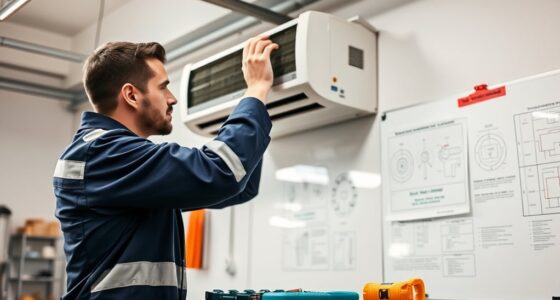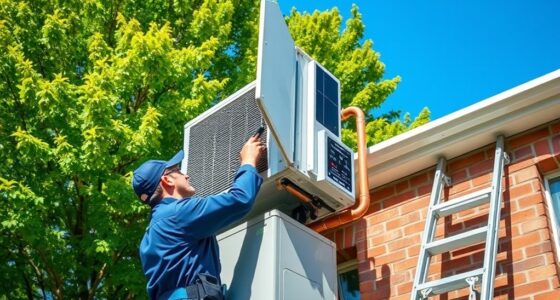Professional training is crucial for heat pump technicians to guarantee safe, efficient, and compliant installations. It boosts your skills in troubleshooting, system tuning, and noise management, making you more effective and credible. Proper certification helps you stay updated on safety regulations and environmental standards, increasing your job security and earnings. Staying current with industry advancements also enhances your ability to support sustainable energy solutions. Keep exploring to discover how ongoing education can elevate your career further.
Key Takeaways
- Proper training ensures safe, efficient, and compliant heat pump installations, reducing safety hazards and system malfunctions.
- Certified technicians demonstrate expertise, increasing job opportunities, customer trust, and earning potential in a growing industry.
- Ongoing professional development keeps technicians updated on new technologies, safety standards, and regulatory requirements.
- Specialized training improves troubleshooting, maintenance, and diagnostic skills, leading to better service quality and system longevity.
- Knowledgeable technicians support sustainability efforts by correctly installing eco-friendly heating systems aligned with environmental standards.
The Growing Demand for Skilled Heat Pump Technicians

As the heat pump market expands rapidly, the need for skilled technicians has never been greater. Industry demand for qualified heat pump technicians is soaring due to the shift toward renewable heating solutions and stricter regulations, like phasing out gas boilers after 2035 in the UK. Training programs focus on equipping you with practical skills essential for installing and maintaining energy-efficient systems. Certification is vital, demonstrating your expertise and boosting job opportunities in the HVAC industry. As the market grows from $100 billion in 2024 to over $156 billion by 2030, your skills will be in high demand. This expanding industry offers numerous career prospects for those who invest in specialized training, ensuring you stay ahead in the evolving landscape of renewable heating technology. Developing expertise in heat pump tuning can further enhance your ability to optimize system performance and efficiency. Additionally, understanding noise levels of modern heat pumps is important for ensuring the systems you install operate quietly, thereby increasing customer satisfaction. Staying updated on industry standards and best practices is also crucial for maintaining a competitive edge and ensuring compliance with regulations. Moreover, gaining knowledge about emerging technological innovations can position you as a leader in the field and open up new opportunities for advanced service offerings. Continuous learning about renewable energy integrations can further expand your capabilities and adapt to future industry shifts.
Ensuring Safe and Efficient Installations Through Proper Training
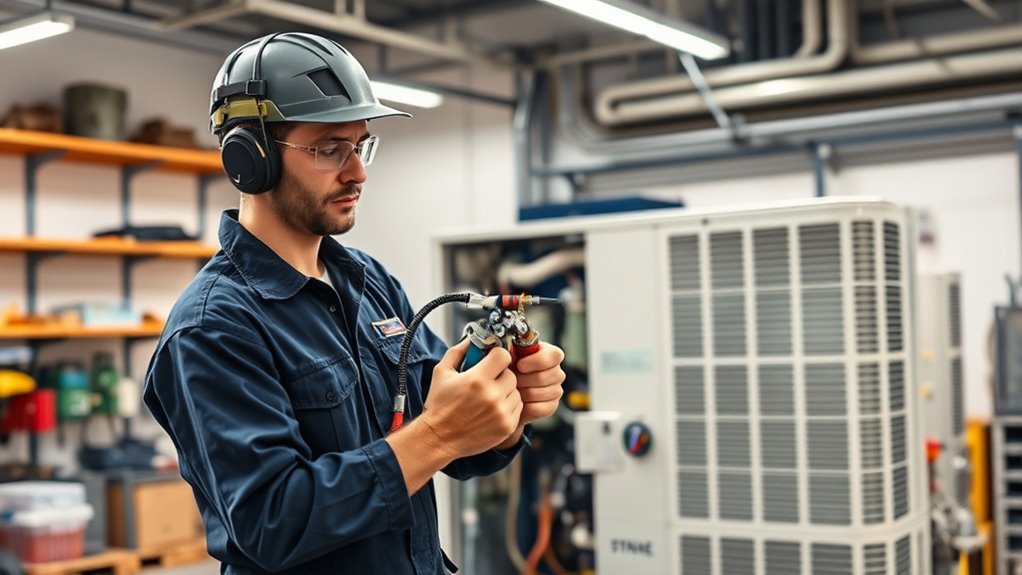
Proper training is essential to guarantee that heat pump installations are both safe and efficient. With proper training, heat pump installers learn correct installation procedures, reducing risks of malfunctions and safety hazards. Certified technicians understand safety standards, including refrigerant handling per EPA 608 requirements, preventing environmental issues. They also master precise sizing and airflow management, optimizing system efficiency and avoiding damage. Well-trained installers can identify and troubleshoot safety concerns like electrical faults or refrigerant leaks, ensuring reliable operation. This thorough education on safety protocols minimizes costly errors, accidents, and warranty claims, improving installation quality. Additionally, understanding system optimization techniques helps ensure long-term performance and energy savings. Furthermore, comprehensive training enables technicians to stay current with evolving technologies and standards, promoting continuous improvement.
Enhancing Service Quality With Specialized Knowledge and Skills
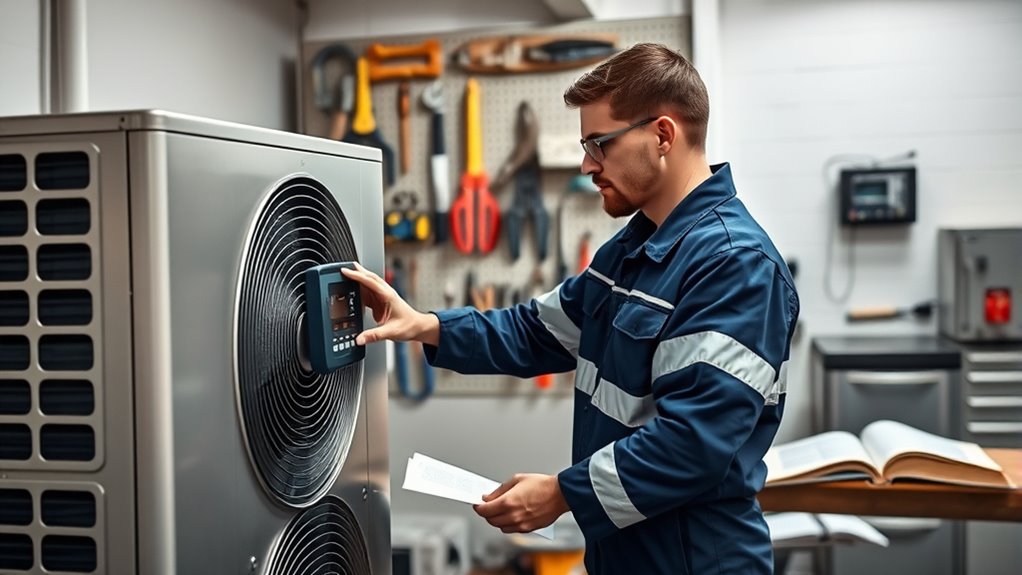
Building on the foundation of safe and efficient installations, enhancing service quality relies heavily on specialized knowledge and advanced skills. With thorough training, you gain the technical skills needed to troubleshoot and maintain heat pump systems effectively, ensuring ideal system efficiency and longevity. Hands-on experience with diagnostic tools allows you to quickly identify and resolve complex issues, minimizing downtime for customers. Staying current with industry standards and safety regulations through certification helps reduce errors and boosts service quality. Your expertise enables you to recommend the best solutions, increasing customer satisfaction and trust. Moreover, understanding industry-specific standards ensures compliance and enhances your credibility as a professional. Additionally, familiarity with cybersecurity considerations can help protect connected heat pump systems from vulnerabilities. Engaging in continuous training ensures you stay updated on the latest technological advancements and regulatory requirements. Recognizing the importance of refrigerant management is essential for maintaining system performance and environmental safety. Furthermore, understanding technological advancements allows you to incorporate innovative solutions into your service offerings. Ultimately, continuous professional development ensures you deliver reliable, high-quality service, supporting both energy savings and eco-friendly goals of heat pump systems.
Staying Compliant With Industry Regulations and Standards

Staying compliant with industry regulations and standards is essential for heat pump technicians to guarantee safe, legal, and efficient service. To do this, you must stay current on evolving compliance standards, building codes, and environmental standards. Certifications like EPA 608 ensure you’re knowledgeable about refrigerant handling, aligning with safety and environmental standards. Regular participation in training programs helps you keep up with industry standards set by organizations like ASHRAE and the EU. These standards guide best practices, emphasizing the importance of understanding local regulations and safety protocols. Additionally, staying informed about merchant services and recent legal changes can help you navigate the financial and regulatory aspects of your work effectively. Moreover, understanding vetted industry resources and reputable training providers can enhance your professional development and ensure you adhere to the highest standards. Keeping yourself updated on industry standards and participating in ongoing education is vital for maintaining your license and reputation in the field. Staying engaged with industry associations can also provide valuable networking opportunities and access to the latest compliance updates. Educating yourself about industry-specific tools and technologies further supports adherence to best practices in the field.
Boosting Career Prospects and Earning Potential
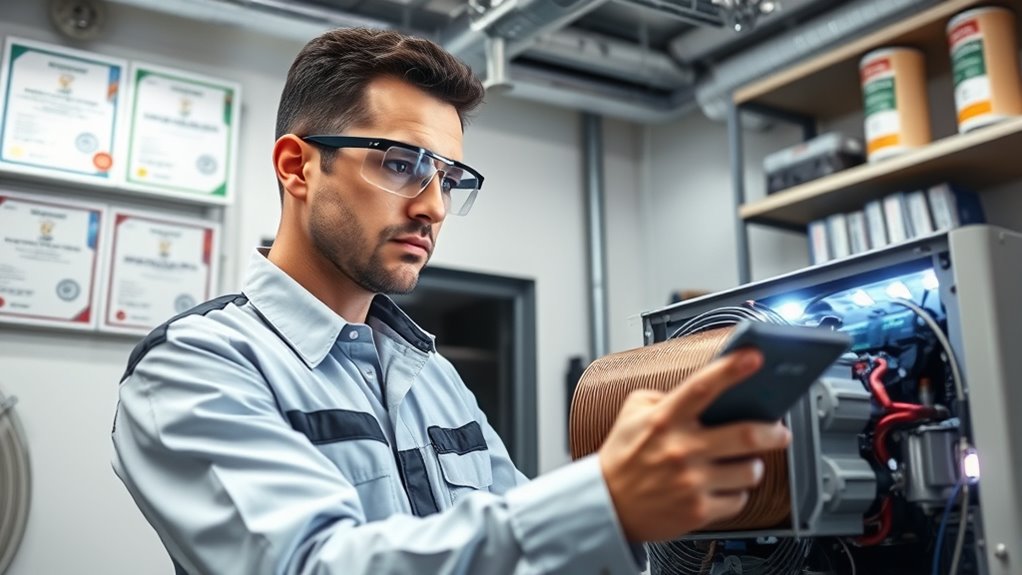
Completing certified heat pump training can substantially boost your earning potential by opening doors to higher-paying, specialized installation and maintenance jobs. With the right professional courses, you’ll gain expertise in heat pump systems, making you more competitive in the job market. As industry demand for qualified heat pump technicians grows rapidly, your enhanced skills improve your career prospects and increase job opportunities. Certified heat pump technicians are often preferred by employers and clients, which can lead to better contracts and long-term stability. Advanced training in heat pump technology positions you to capitalize on the expanding renewable energy sector, further boosting your earning potential. Staying informed about AI security developments can help you understand evolving industry standards and safety practices. Additionally, acquiring industry-specific knowledge ensures you remain updated on the latest advancements and regulations in heat pump technology. Keeping abreast of automation in business can also help you understand how technological innovations are shaping the industry landscape. Moreover, engaging in ongoing professional development helps maintain your credentials and adapt to emerging trends, ensuring sustained growth in your career. Gaining technical expertise through specialized training can differentiate you from competitors and lead to higher-paying opportunities. Overall, investing in professional courses elevates your expertise, making you a sought-after specialist with greater income and career growth possibilities.
Supporting Sustainability and the Transition to Green Energy
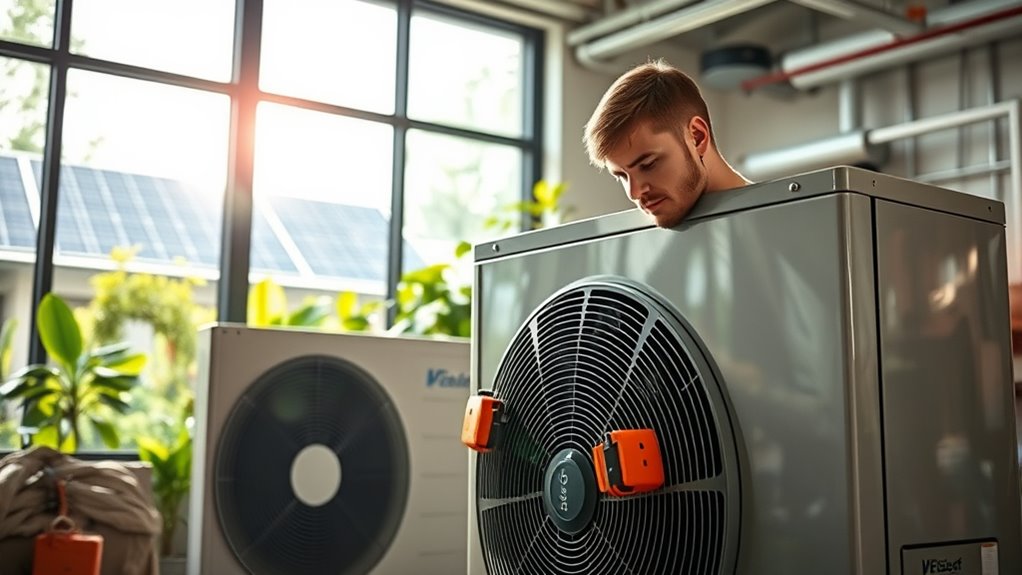
Supporting sustainability and the shift to green energy relies heavily on well-trained heat pump technicians. Your expertise helps implement systems that harness renewable energy, advancing energy conservation and carbon reduction. Proper training guarantees you can accurately size and install heat pumps, maximizing efficiency and promoting eco-friendly heating. By adhering to industry standards and environmental regulations, you ensure responsible system operation. Skilled technicians accelerate the adoption of low-carbon solutions, contributing to the UK’s transition away from gas boilers after 2035. Focused training and education empower you to:
Well-trained heat pump technicians drive sustainable energy, ensuring efficient, compliant, and eco-friendly heating solutions.
- Support sustainable energy initiatives
- Optimize heat pump performance
- Ensure compliance with regulations
- Promote eco-friendly heating options
- Drive industry progress toward climate goals
A thorough understanding of personality traits can also improve communication and teamwork in professional settings, enhancing collaboration and project success. Additionally, gaining knowledge of sound design techniques can enhance your ability to communicate complex technical information effectively within multidisciplinary teams. Developing a solid foundation in industry standards ensures that technicians remain up-to-date with the latest innovations and safety protocols, further supporting the transition to sustainable energy solutions. Incorporating ongoing professional development is essential for maintaining high competency levels and adapting to emerging technologies in the industry. Moreover, integrating AI security principles can help protect sensitive data and ensure cybersecurity best practices in the management of smart heat pump systems.
Frequently Asked Questions
Why Is HVAC Training Important?
You need HVAC training because it equips you with the skills to install, maintain, and repair complex systems safely and efficiently. It helps you meet industry standards, earn certifications, and stay updated on the latest technology and regulations. With proper training, you reduce errors, boost customer satisfaction, and increase your earning potential. Continuous education keeps you relevant in a competitive industry, opening doors to career growth and success.
Why Don’t Contractors Like Heat Pumps?
You might think contractors dislike heat pumps because they’re just complex gadgets, right? In reality, it’s more about the steep learning curve, tricky sizing, airflow, and space needs that make them wary. Without proper training, troubleshooting feels intimidating, costs seem high upfront, and market demand appears uncertain. So, instead of diving in, many prefer sticking to familiar systems, fearing the headaches and unknowns heat pumps bring without the right skills.
How in Demand Are HVAC Technicians?
You’ll find HVAC technicians in high demand, especially as more people adopt energy-efficient systems like heat pumps. The job outlook projects a 5% growth from 2022 to 2030, outpacing many other fields. With a current shortage of qualified professionals, your skills are increasingly valuable. As technology advances and regulations change, your expertise will be essential, offering you job security and plenty of opportunities in a growing industry.
What Is the Major Problem of a Heat Pump?
The major problem with a heat pump is reduced efficiency in extremely cold temperatures, making it struggle to heat effectively. Frost buildup on the outdoor coil can block heat transfer, causing malfunctions. Improper sizing or installation leads to short cycling and higher energy use. Refrigerant leaks diminish performance and harm the environment. Without proper maintenance and troubleshooting skills, your system’s lifespan shortens, and failures become more likely.
Conclusion
So, next time you see a heat pump technician confidently fixing your system, remember—behind that smile is a pro who’s probably spent more time training than binge-watching your favorite series. Proper training guarantees safe, efficient, and regulation-compliant work, all while boosting their career and helping the planet stay cool. Because, really, who wouldn’t want a green energy hero with a toolbox full of skills instead of just a wrench and a prayer?


